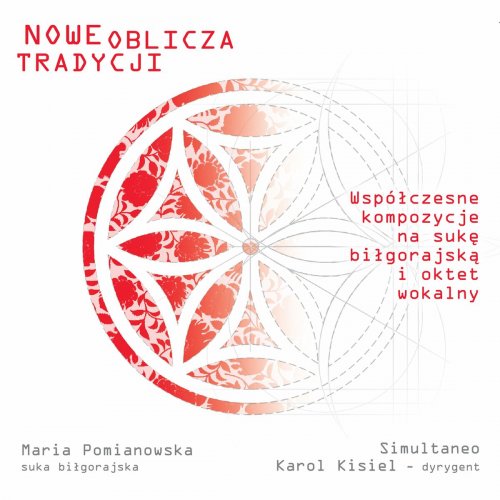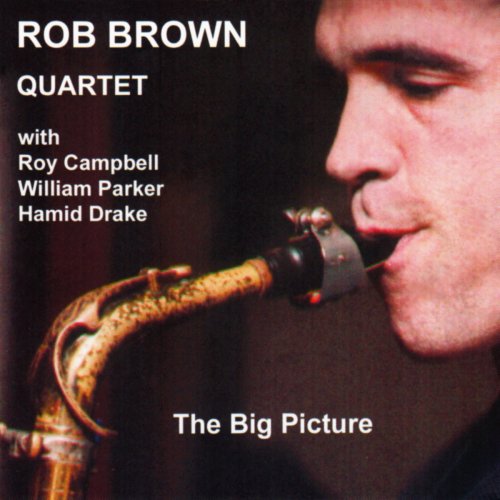Maria Pomianowska - Nowe oblicza tradycji - współczesne kompozycje na sukę biłgorajską i oktet wokalny (2024)

Artist: Maria Pomianowska, Karol Kisiel, Simultaneo
Title: Nowe oblicza tradycji - współczesne kompozycje na sukę biłgorajską i oktet wokalny
Year Of Release: 2024
Label: Polskie Radio
Genre: Classical
Quality: FLAC (tracks)
Total Time: 57:10 min
Total Size: 322 MB
WebSite: Album Preview
Tracklist:Title: Nowe oblicza tradycji - współczesne kompozycje na sukę biłgorajską i oktet wokalny
Year Of Release: 2024
Label: Polskie Radio
Genre: Classical
Quality: FLAC (tracks)
Total Time: 57:10 min
Total Size: 322 MB
WebSite: Album Preview
01. Sześć pieśni sobie śpiewanych: Zachwyt ducha do Ducha Najświętszego - prolog
02. Sześć pieśni sobie śpiewanych: Modlitwa poranna
03. Sześć pieśni sobie śpiewanych: O miłości miłośna
04. Sześć pieśni sobie śpiewanych: Pieśń chwalebna wzywa wszelkie stworzenie, iżby chwaliły Boga
05. Sześć pieśni sobie śpiewanych: Modlitwa południowa
06. Sześć pieśni sobie śpiewanych: Modlitwa wieczorna
07. Skarga
08. Anielskie Zaklęcia
09. Podróż
10. Fortuna
International inspirations, inspired compositions, outstanding performers. The new album by Polish Radio is a ticket to asylum, in which the harmony of eight human voices is complemented by the sound of the most Polish "violin" in the world - the Biłgoraj Suka.
There is no need to explain to anyone what a vocal octet is, although it is worth noting that Simultaneo from Gdańsk is one of only a few bands in Poland in this format, operating at a world-class artistic level.
And what is the Biłgoraja suka, an instrument known until recently only from historical records and a watercolor painted at the end of the 19th century by Wojciech Gerson? In a nutshell: it is one of the varieties of fiddles, simple (though not primitive) violins from what is now Poland. Folk masters played them by holding them vertically on their knees or hanging them on their shoulders. The original examples of the Biłgoraj suka have not survived to this day, but it is known that it was a five- or four-stringed instrument; it was played with a bow, and to obtain the desired pitch, the strings on the wide neck were shortened by pushing them away with a fingernail plate.
Maria Pomianowska - a virtuoso of ethnic instruments, composer, manager, traveler, teacher and tireless seeker of musical treasures from the past and present (and a formally trained classical cellist) - devoted a significant part of her extensive career to the idea of reviving the entire family of Polish fidels and their popularization. He has been playing the replica of the Biłgoraj souk built by luthier Andrzej Kuczkowski and ethnomusicologist Ewa Dahlig-Turek for over thirty years. She independently created her performance practice (playing technique, repertoire and style).
"New faces of tradition" - a project with an unsophisticated but revealing title - was invented by conductor Karol Kisiel, head of the Simultaneo vocal octet: - The idea was to present the Biłgoraj souk surrounded by a choral (though in an intimate form) sound environment created by artists from Poland, Serbia and Latvia. The composers invited to cooperate learned almost from scratch the sonic nature of the bitch and its technical conditions; Thanks to this, the unique instrumental-vocal configuration became an inspiration for them, not a limitation.
The international experiment turned into a multi-part, but coherent and atmospheric - and accessible to the listener - work of musical art.
"Six songs sung to each other" by Anna Rocławska-Musiałczyk is a cycle of short, polyrhythmic pieces in which there are practically no solo voices (except for the third part, where the soprano sings solo with a white voice). The female dog and the singers complement each other, interpenetrate, look for common spaces - says Maria Pomianowska. - In turn, in "Angel Spells" by Aleksandra Vrebalov from Serbia, the female dog dominates. The role of the choir, very difficult because the composer combined contemporary techniques with the aesthetics known from Eastern churches, is to create a sound cushion for the soloist. "Fortuna" by Uģis Prauliņš from Latvia is the most folk and varied song on the album. Also the most virtuoso and "violin-like", stylistically bold. And how finely Jan Kochanowski's text was used here! I wrote "The Complaint" and "The Journey" during the pandemic, willingly or unwillingly cutting myself off from many external stimuli. I let the bitch lead me, I didn't think about anything I already know and do every day. The melodies flowed out of me and... stayed with me as part of my concert repertoire. They act as interludes on the album.
During the recording session, the octet consisted of: Magdalena Łaszcz and Alicja Giętkowska-Liguz (sopranos), Ksenia Sawczenko and Joanna Ślesicka (altos), Jan Suchorzewski and Tomasz Grygo (tenors), Paweł Nodzak (baritone) and Mateusz Kempa (bass). Karol Kisiel conducted.
Creation of the compositions, their premiere at the St. Center. Jana in Gdańsk in July 2022 and the recording of the album was possible thanks to a grant granted to the Polihymnia Foundation as part of
"Composer's orders" program of the Ministry of Culture and National Heritage, implemented by the National Institute of Music and Dance.
There is no need to explain to anyone what a vocal octet is, although it is worth noting that Simultaneo from Gdańsk is one of only a few bands in Poland in this format, operating at a world-class artistic level.
And what is the Biłgoraja suka, an instrument known until recently only from historical records and a watercolor painted at the end of the 19th century by Wojciech Gerson? In a nutshell: it is one of the varieties of fiddles, simple (though not primitive) violins from what is now Poland. Folk masters played them by holding them vertically on their knees or hanging them on their shoulders. The original examples of the Biłgoraj suka have not survived to this day, but it is known that it was a five- or four-stringed instrument; it was played with a bow, and to obtain the desired pitch, the strings on the wide neck were shortened by pushing them away with a fingernail plate.
Maria Pomianowska - a virtuoso of ethnic instruments, composer, manager, traveler, teacher and tireless seeker of musical treasures from the past and present (and a formally trained classical cellist) - devoted a significant part of her extensive career to the idea of reviving the entire family of Polish fidels and their popularization. He has been playing the replica of the Biłgoraj souk built by luthier Andrzej Kuczkowski and ethnomusicologist Ewa Dahlig-Turek for over thirty years. She independently created her performance practice (playing technique, repertoire and style).
"New faces of tradition" - a project with an unsophisticated but revealing title - was invented by conductor Karol Kisiel, head of the Simultaneo vocal octet: - The idea was to present the Biłgoraj souk surrounded by a choral (though in an intimate form) sound environment created by artists from Poland, Serbia and Latvia. The composers invited to cooperate learned almost from scratch the sonic nature of the bitch and its technical conditions; Thanks to this, the unique instrumental-vocal configuration became an inspiration for them, not a limitation.
The international experiment turned into a multi-part, but coherent and atmospheric - and accessible to the listener - work of musical art.
"Six songs sung to each other" by Anna Rocławska-Musiałczyk is a cycle of short, polyrhythmic pieces in which there are practically no solo voices (except for the third part, where the soprano sings solo with a white voice). The female dog and the singers complement each other, interpenetrate, look for common spaces - says Maria Pomianowska. - In turn, in "Angel Spells" by Aleksandra Vrebalov from Serbia, the female dog dominates. The role of the choir, very difficult because the composer combined contemporary techniques with the aesthetics known from Eastern churches, is to create a sound cushion for the soloist. "Fortuna" by Uģis Prauliņš from Latvia is the most folk and varied song on the album. Also the most virtuoso and "violin-like", stylistically bold. And how finely Jan Kochanowski's text was used here! I wrote "The Complaint" and "The Journey" during the pandemic, willingly or unwillingly cutting myself off from many external stimuli. I let the bitch lead me, I didn't think about anything I already know and do every day. The melodies flowed out of me and... stayed with me as part of my concert repertoire. They act as interludes on the album.
During the recording session, the octet consisted of: Magdalena Łaszcz and Alicja Giętkowska-Liguz (sopranos), Ksenia Sawczenko and Joanna Ślesicka (altos), Jan Suchorzewski and Tomasz Grygo (tenors), Paweł Nodzak (baritone) and Mateusz Kempa (bass). Karol Kisiel conducted.
Creation of the compositions, their premiere at the St. Center. Jana in Gdańsk in July 2022 and the recording of the album was possible thanks to a grant granted to the Polihymnia Foundation as part of
"Composer's orders" program of the Ministry of Culture and National Heritage, implemented by the National Institute of Music and Dance.
![Johnny Mathis - Sending You a Little Christmas (2013) [Hi-Res] Johnny Mathis - Sending You a Little Christmas (2013) [Hi-Res]](https://img.israbox.com/img/2025-12/23/38ptbeu2vtopjom56b48st4yc.jpg)

![Don Cherry, Dewey Redman, Charlie Haden & Ed Blackwell - Old And New Dreams (1979/2025) [Hi-Res] Don Cherry, Dewey Redman, Charlie Haden & Ed Blackwell - Old And New Dreams (1979/2025) [Hi-Res]](https://www.dibpic.com/uploads/posts/2025-12/1766322079_cover.jpg)

![Art Ensemble Of Chicago - Full Force (1980/2025) [Hi-Res] Art Ensemble Of Chicago - Full Force (1980/2025) [Hi-Res]](https://www.dibpic.com/uploads/posts/2025-12/1766322547_cover.jpg)



